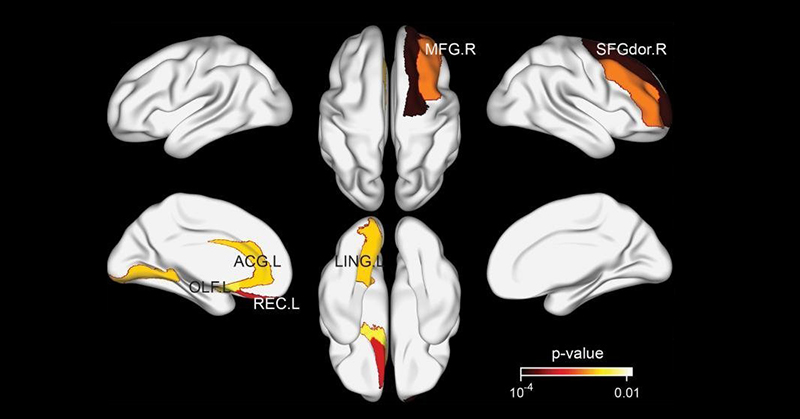Does Tea Equal a Healthier Brain? Research Points to Yes : The Hearty Soul

I know all my fellow tea lovers are going to be hyped about this.
According to new research in the journal Aging, people who drink tea on a regular basis have a “more efficient structural organization” of their brains than people who don’t drink tea [1]. This improved organization may help protect against cognitive decline—think disorders such as dementia and Alzheimer’s disease.
While the study was small—just 36 adults, all of them 60 or older—this research is part of many other studies that support tea’s positive effects on the mind and body, which we’ll look at in a moment.
The research focused on green, black, and oolong tea. So let’s learn a bit more about what the research entailed and what the specific health benefits are of these three delicious brews!
Before we continue, I want to note that when I reference “tea” in this article, I will be specifically referring to tea from the Camellia sinensis plant, which is where green, black, oolong and white tea come from. Herbal tea, which technically isn’t “tea”, is not relevant to the information contained in this article.
What the Research Showed
Researchers gathered information about the participants’ health, lifestyle, and psychological state. Each of the participants had an MRI and neuropsychological testing to better understand their brain health. The study went on for three years, from 2015-2018.
The results? Individuals who drank either green, oolong, or black tea at least four times a week had improved connections among their different brain regions.
One of the authors of the study, Lei Feng, compared these connections and efficiency to traffic: “When a road system is better organized, the movement of vehicles and passengers is more efficient and uses less resources. Similarly, when the connectors between brain regions are more structured, information processing can be performed more efficiently.”
While the research doesn’t prove causation between tea and a better-organized brain, their findings do suggest that regular tea drinking could improve or support cognitive performance, which relies on the organization of the brain.
However, more research is needed to understand the effects of tea on the brain, as well as its role in cognitive performance throughout the aging process.
Why Is Tea So Healthy?
Tea has a few key components that benefit our health, including polyphenols, which are organic chemicals that have antioxidant properties. Polyphenols help prevent diseases such as heart disease and cancers, neurodegenerative diseases, and even diabetes and osteoporosis [2].
Tea also contains other helpful vitamins and minerals, including vitamin C and E, folic acid, and potassium, as well as amino acids such as l-theanine, which can increase mental alertness while also promoting relaxation [3].
These are just a few of the elements that make tea so beneficial for our bodies and minds!
Other Supporting Research for Tea’s Positive Effects on the Body and Mind
Other studies have shown how tea benefits human health. Tea from the Camellia sinensis plant, which is where all tea comes from, lowers stress hormone cortisol, as well as lowers risk of depression and dementia [4].
However, let’s take a closer look at the three teas specifically mentioned in this new study and their potential to benefit our health based on research!
Black Tea
Black tea is one of the most popular types of tea. You may recognize black tea as the base for chai, Earl Grey, and many iced teas that are popular in the summer. What are some of black tea’s benefits for our health?
- Black tea has been shown to speed up cognitive processing, improve memory, and reduce errors in cognitive tasks [5].
- Consuming three cups of black tea every day for six months has been shown to decrease blood pressure in one study [6].
- Drinking four or more cups of black tea a day has been associated with a lower risk of stroke [7].
- Black tea may even reduce the risk of hormone-dependent breast cancers [8].
Green Tea
Green tea is one of my absolute favorite teas. You may recognize green tea as the base for jasmine tea, and is also what constitutes matcha tea! How does green tea support health and wellness?
- Research shows green tea can reduce anxiety and benefit memory and attention, which can help support brain function [9].
- Green tea may lower your risk for cardiovascular (heart) disease [10].
- Drinking green tea can help prevent obesity and regulate body fat [11].
- Green tea has been shown to lower risk for certain types of cancer, including prostate cancer and colorectal cancer [12], [13].
Oolong Tea
I love oolong tea and it makes me think of that scene in the movie Coraline where her eccentric downstairs neighbors are arguing over whether to serve her jasmine or oolong tea
While research on oolong tea hasn’t been as extensive as that on green and black tea, there are a few important takeaways from oolong tea’s health benefits:
- Consumption of oolong tea can help lower risk for cognitive impairment and decline [14].
- One study says that evidence supports “the role of tea as an effective yet simple lifestyle preventative measure” for Alzheimer’s disease (including black, green, and oolong) [15].
- Other research notes that oolong tea, along with black and green tea, contributes to better cognitive performance and protective effects on cognition [16].
So Should You Start Drinking Tea?
Although much research exists about tea’s positive health benefits, there’s still more to be discovered in how tea helps us. And, I would note that all these forms of tea contain varying levels of caffeine. If you’re sensitive to caffeine, you should be mindful of how much tea you consume. (I’m pretty sensitive to caffeine but find that I can safely drink 2-4 cups of tea a day, provided it’s before 1 p.m.!)
Whether or not you choose to drink tea is entirely up to you—but if you enjoy a good cup of black, green, or oolong tea, you could just help protect your brain from cognitive decline later in life!





